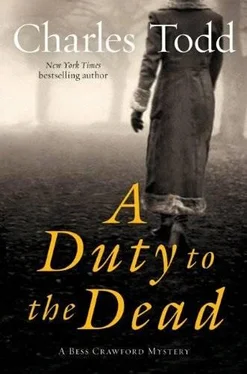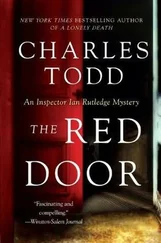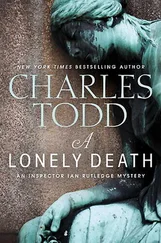“No.”
We had come back to Number 17. Peregrine stopped to gaze up at the chimney pots of the house across the square.
A constable strolled into Carroll Square and came toward us. I could feel the tension that gripped Peregrine Graham at the sight of him.
Did he have that pistol with him? My throat was suddenly dry.
Peregrine said under his breath, “If you do anything to attract that policeman’s attention, I’ll kill him.” There was no emotion in his voice. I believed him.
We walked on, two people enjoying a companionable silence. I could feel the smile plastered on my face begin to crack from the strain of keeping it in place. But the constable looked at us anyway. I realized that I was a respectably dressed young woman, while the man at my side was wearing a suit that didn’t fit him and his face was still pale, with dark circles under his eyes.
Oh, my God. Does he look like a convict-or someone just escaped from an asylum?
Or will he pass for a wounded soldier in civilian clothes he’s outgrown?
The constable walked on, in spite of the second glance he’d given Peregrine. I started to breathe again.
“If we’re to promenade around London like this, you must have decent clothes,” I said, my voice angrier than I’d intended. But I could see again in my mind’s eye how that constable had stared, and if he’d stopped us, it didn’t bear thinking of.
Peregrine turned to me, amusement in his eyes. “You don’t care for the good doctor’s taste in clothes?”
I retorted, “If you attract attention to yourself because you don’t appear to belong in a neighborhood like this one, it won’t be my fault.”
He looked down at his clothing. I don’t believe he’d given a single thought to his appearance, except for the beard.
“I have told you. I have no money. There’s nothing to be done about it. Can we go into the square? It has benches. I need to sit down.”
“Only the residents have a key to the gates.”
“Ah.” He did look exhausted. “All right, I want-” He stopped. The sun had come out from behind a cloud, and suddenly the windows on the far side of the square were lit as if from within by the golden light. “Look!” His exhaustion vanished in his excitement. “I remember now. That chimney pot, the one on the left side-see, there’s a missing tile, and when the sunlight hits it just so, the shadow resembles a small dog.”
I couldn’t see it. But he crossed to the square, the better to see Number 17 and stare up at its windows, as if expecting to find himself at fourteen gazing down, then he positioned himself on the walk, and turned toward the house opposite.
“They’ve painted the door a dark green, but it was black once. As were the shutters. But, by God, this is the right street!”
“There must be others just like this one.”
“No, I’d stake my life on this.”
Across the square, the constable stopped to speak to a housemaid just coming up from the tradesmen’s entrance. Then he turned our way and began to stroll back toward us, as if he hadn’t a care in the world.
“Come away, Peregrine, please! We’ve loitered here long enough. Please, before that constable catches us up.”
Peregrine seemed not to hear me, his mind on something else. Then he turned, took my arm, and we walked on, toward the corner. I wanted to hurry, to look back over my shoulder, but I dared not draw attention to us again. At the corner we turned away from Carroll Square, and I felt my heart begin to beat normally again.
Peregrine’s grip on my arm tightened until his fingers felt like they were bruising the skin. “How did you know?” he asked. “Who told you where to find that house again?”
Surprised by the unexpected attack, I said, “It was Mrs. Clayton-”
“I don’t remember anyone of that name. You’re lying.”
“No, truly, I’m not.”
“Did you live here before, is that it? Is that why you came to visit the Grahams? I asked you if you were Arthur’s wife. You told me he was dead. Why were you in Owlhurst?”
“Peregrine. Mr. Graham. I was the nursing sister with Arthur when he died onboard Britannic. I came to visit Mrs. Graham, to-to talk to her about the day Arthur died. He had asked me to. It was his dying wish.”
“He wouldn’t have asked you to come to Owlhurst. Unless there was more to your relationship than nurse and patient.”
“You aren’t required to judge any relationship of mine,” I retorted coldly. “I’m helping you because you are here, you are armed, and I have no choice.”
“You saved my life,” he said sardonically. “And your letter gave me a place to hide in London. And you must have been asking questions about me, or you wouldn’t have known about a house my family lived in for only a few weeks nearly fourteen years ago.”
I could feel myself turning red, and not from the cold wind.
“I admit to some curiosity. Arthur Graham told me he had three brothers, but he said almost nothing about them. When I arrived in Owlhurst, there were only two, and no one told me anything about you. When you were being carried to Owlhurst, and I’d volunteered to attend you, your mother explained in the briefest terms what I was getting myself into. I should have trusted my instincts and let you die!”
He chuckled. It was the oddest sound, coming from a confessed murderer. I hadn’t expected a sense of humor and looked up at him, startled.
“Some curiosity, indeed,” he repeated, mimicking me.
We were standing on Radcliffe Street, waiting to hail a cab.
I felt a touch on my shoulder. “Miss?”
I turned, alarmed, and found myself face-to-face with the constable we’d seen in Carroll Square.
“Constable?” It was all I could manage. Peregrine’s fingers were still digging into my arm, their iron grip biting through the cloth of my coat and my sweater.
“Is this man annoying you, Miss?”
My eyes moved to Peregrine’s face. He had turned toward the constable, and was waiting for me to answer.
“His name is William,” I said in a voice I knew wasn’t my own but prayed the constable would think I was shrill as a rule. “He worked for my family before the war. He wanted to see where his-his brother had been in service before volunteering for the army.”
“He’s not in the army himself?” the constable asked.
“I’m home on leave,” Peregrine answered. “Pneumonia. Not as glorious as dying, is it?”
The constable nodded. “You oughtn’t be out of uniform,” he admonished Peregrine.
“It’s just for today.” He indicated his cuffs and the shortness of his trousers. “I’ve outgrown them. My mum says I’d added an inch since I’ve been in the army.”
The constable smiled. “Good luck to you, son.” He touched his cap to me and walked on.
Before I could fall down in relief, I caught the eye of a cabbie coming toward us and hailed him.
“I see what you mean about the clothing,” Peregrine said after I’d given the man the address of Mrs. Hennessey’s house. “Will you buy me a new suit of clothes, for your sake and the sake of the police? I have no money. I can’t pay you back.”
There was the shop where my father bought his clothes and had his uniforms tailored. I leaned forward and told the cabbie that I’d changed my mind and wished to go to Oxford Street. He nodded, and we turned toward Piccadilly.
Peregrine sat back and closed his eyes. His face was gray with fatigue.
I sat there counting the lies I’d told to the police. I’d be an accomplished liar before Peregrine Graham and I were done.
I leaned a little forward. Where was the pistol? In his coat pocket? If he was being measured for a new suit of clothes, he’d have to remove that heavy coat…
Читать дальше












